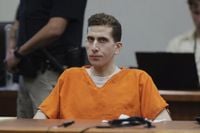On July 23, 2025, Bryan Kohberger was sentenced to four consecutive life sentences without the possibility of parole for the brutal murders of four University of Idaho students. The sentencing hearing, held in Boise, Idaho, marked the painful culmination of a case that gripped the nation and left a community shattered.
The victims—Kaylee Goncalves, Ethan Chapin, Xana Kernodle, and Madison Mogen—were found stabbed to death in their off-campus home in Moscow, Idaho, during the early hours of November 13, 2022. Kohberger, a former criminology graduate student at Washington State University, pleaded guilty earlier that month to burglary and four counts of first-degree murder, avoiding the death penalty through a plea deal with prosecutors.
In the courtroom, the atmosphere was heavy with grief and raw emotion as friends and family members delivered searing victim impact statements. Kaylee Goncalves’ sister, Alivea Goncalves, did not hold back, directly confronting Kohberger with fierce words. She called him a “joke,” “loser,” and “as dumb as they come,” asserting, “If you hadn’t attacked them in their sleep, in the middle of the night like a pedophile, Kaylee would have kicked your fking a.” Her words drew applause from the courtroom, reflecting the collective anger and pain of those present.
Alivea’s statement was a stark reminder of the personal devastation behind the headlines. She challenged Kohberger with pointed questions: “How was your life right before you murdered my sister? Did you prepare for the crime before leaving your apartment? Please detail what you were thinking and feeling at the time.” She dismissed him as a “sociopath, psychopath, murderer” and told him bluntly, “No one thinks that you are important. The truth is, you’re basic.”
Steve Goncalves, Kaylee’s father, also addressed Kohberger directly, turning the lectern to face him. His words were equally unflinching: “The world’s watching because of the kids, not because of you. Nobody cares about you. … In time, you will be nothing but two initials, forgotten to the wind.” He recounted how quickly police had identified Kohberger, noting, “Police officers tell us within minutes they had your DNA. Like a calling card. You were that careless. That foolish. That stupid. Masters degree? You’re a joke. Complete joke.”
Other family members joined in remembering the vibrant lives lost. Benjamin Mogen, father of Madison, read a heartfelt Father’s Day card she had written, while her grandmother shared the story of an angel wing tattoo she got in Madison’s memory. The students’ two surviving roommates also spoke, sharing how they grapple with the trauma of the attack and strive to live in honor of their lost friends.
The case drew national attention, becoming the subject of numerous books, podcasts, and documentaries. Social media buzzed with speculation about Kohberger’s motive—a mystery that remains unsolved even after his confession. Prosecutors have not presented any theory connecting Kohberger to the victims personally, nor have they revealed any interaction between them prior to the murders.
At the sentencing hearing, Idaho Fourth Judicial District Judge Steven Hippler expressed sympathy for the families’ pain but emphasized the limits of the court’s power. When asked if Kohberger wished to make a statement, he declined, saying, “I respectfully decline.” The judge stated that forcing Kohberger to speak would inappropriately focus attention on him and questioned whether any forced explanation could be trusted. “Even if I could force him to speak, which legally I cannot, how could anyone ever be assured that what he speaks is the truth?” he remarked.
Dr. Katherine Ramsland, a forensic psychology professor who taught Kohberger at DeSales University, expressed her disbelief at his arrest. “I thought, ‘They have to have this wrong,’” she said. “This has to be wrong. It’s not the Bryan Kohberger that I know.”
Prosecutors detailed the chilling sequence of events: Kohberger entered the large off-campus home and first killed Madison Mogen and Kaylee Goncalves on the third floor. He then descended to the second floor, where he encountered Xana Kernodle and Ethan Chapin, killing them as well. Notably, Bill Thompson, Latah County Prosecutor, confirmed there was no evidence of any sexual component or assault in the crimes.
Investigators tied Kohberger to the scene through cellphone data, DNA, and surveillance footage. His phone connected to a nearby cell tower nearly two dozen times before the murders, and DNA found on a knife sheath matched his. He was arrested weeks later at his parents’ home in Albrightsville, Pennsylvania, after an extensive nationwide search.
The plea deal and sentencing sparked mixed reactions. While the family of Madison Mogen expressed support, with her stepfather Scott Laramie stating, “Evilness does not deserve our time and attention. We are done being victims. We are taking back our lives,” the Goncalves family criticized the handling of the case and the absence of a public explanation from Kohberger.
Even political figures weighed in. Former President Donald Trump posted on Truth Social expressing hope that Kohberger would be made to explain his actions. Meanwhile, White House Press Secretary Karoline Leavitt offered condolences to the victims’ families, stating, “If it were up to the president, he would have forced this monster to publicly explain why he chose to steal these innocent souls.”
Despite the conviction and life sentences, the question of motive remains unanswered. Kohberger’s silence leaves a haunting void, frustrating families and communities seeking closure. The brutal loss of four young lives, full of promise and energy, continues to resonate deeply, a stark reminder of the fragility of safety and the enduring quest for justice.
As the court proceedings closed, the families’ testimonies stood as powerful tributes to the victims’ memories, their voices echoing the pain, resilience, and determination to remember their loved ones beyond the tragedy.

